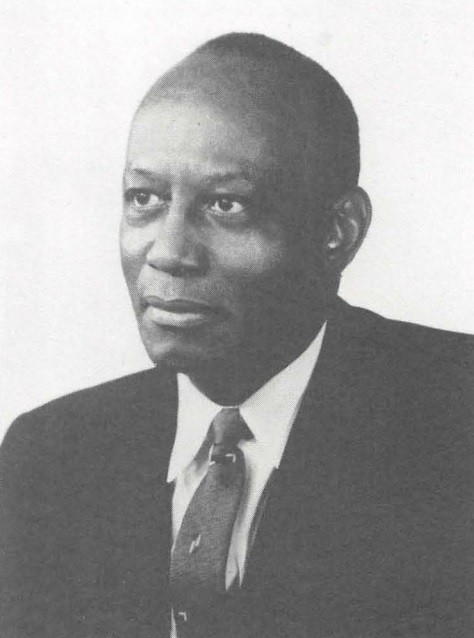Highlighting Australia
- As a proudly Australian initiative, we’re excited to showcase a collection of Australian stories, music, tributes and more.

Join activities, celebrations, study groups, spiritual empowerment and education programs for young people, and more.
Baha’i beliefs address essential spiritual themes for humanity’s collective and individual advancement. Learn more about these and more.


Ellsworth Blackwell (1902 – 1978) was an African-American Baha’i who was dedicated to sharing the principles of the Baha’i Faith in America, Haiti, Madagascar, and Zaire (now the Democratic Republic of the Congo). In this article I would like to share a challenge he faced when confronted with racism within the Baha’i community, and how his commitment to justice, combined with wholehearted co-operation with the governing or administrative bodies of the Baha’i Faith, allowed this instance of prejudice to be resolved while maintaining a unified spirit.
Ellsworth became a Baha’i in 1934, and in 1937 he decided to serve at the Wilmette House of Worship (the Temple was not entirely completed until the 1950s, but it was open to visitors and Baha’is volunteered as tour guides). He had the capacity to be a tour guide, but was informed that it was “policy” that African-Americans could not be tour guides. This example of discrimination was of course not in keeping with the Baha’i teachings on the elimination of prejudice. This quotation from Abdu’l-Baha amply elucidates the Baha’i view:
… as to religious, racial, national and political bias: all these prejudices strike at the very root of human life; one and all they beget bloodshed, and the ruination of the world.1
Unable to reconcile his understanding of the Baha’i teachings with this injustice, Ellsworth wrote to Shoghi Effendi requesting clarification. This resulted in the Chicago Local Spiritual Assembly informing him that in fact no such policy existed. Ellsworth was skeptical, and wrote the following letter to express this:
It is not surprising to me that you would be unable to find a record of such a policy. This subtle prejudice naturally could not be found recorded in the minutes of any religious group – much less a Baha’i group.2
It is a testament to the Chicago Baha’i community that Ellsworth was elected to its Local Spiritual Assembly, and that Ellsworth’s raised concerns about this urgent issue that needed remedying did not fracture the community nor was he ostracized.
Unfortunately, while he was assured that the incident had been a misunderstanding, Blackwell observed that discrimination against African-Americans wishing to guide tours of the Temple persisted, and he raised the issue once again in 1938. As a result, Horace Holley, the Secretary of the National Spiritual Assembly of the Baha’is of the United States, stepped in to facilitate a resolution to the issue.3
Interestingly Holley did not issue a directive or reprimand to the Temple Committee. Instead he organized for Ellsworth to meet with the Temple Committee to consult on the issue. It is my personal view that this approach to the issue by Holley empowered Ellsworth to confront prejudice on his own terms, as an equal to those from whom he was demanding respect, as opposed to an imitation of respect being enforced by a white man exerting his influence on Ellsworth’s behalf.
One can only imagine Ellsworth’s feelings before this meeting, but whatever they were they gave way to relief once the meeting actually took place. The Temple Committee had already conducted a review and found that the discrimination against African-American tour guides was the result of the actions of one individual who had not yet overcome their own prejudice, and that they had already taken steps to resolve this unfortunate state of affairs. Ellsworth’s relief is recorded in a letter he wrote to Horace Holley after this meeting:
…for my part the problem had already been solved a week or two before [the consultation], at which time a colored believer had been asked to guide. That act was at once sufficient for me.2
Ellsworth went on to render many services as a pioneer and travel teacher and also in administrative positions, such as on the National Spiritual Assemblies of the USA, Haiti, and Madagascar, and as Auxiliary Board member for Haiti. He also continued to take stands against prejudice.
The reason this brief anecdote from his life stands out to me is that I believe it demonstrates a tangible practical example of the teachings of the Baha’i Faith being put into selfless action with remarkable results. We read in one of the Tablets of Baha’u’llah the following:
The light of men is Justice. Quench it not with the contrary winds of oppression and tyranny. The purpose of justice is the appearance of unity among men.4
Ellsworth certainly confronted the winds of oppression for the sake of justice, and rather than his courage resulting in bitterness and disunity, it actually facilitated the appearance of unity. Of course this was partially a result of Ellsworth raising concerns, but it was also due to the commitment of both Ellsworth and the Temple Committee to resolve the issue in the name of unity, without compromising on the virtue of justice.5
"*" indicates required fields

We recognise their continuing connection to land, waters and community. We pay our respects to Aboriginal and Torres Strait Islander people and their cultures; and to elders both past and present.
The views expressed in our content reflect individual perspectives and do not represent authoritative views of the Baha’i Faith.

Visit the site of the
Australian Baha’i Community
and the Baha’i Faith Worldwide
Notifications
Wonderful article ! Thank you so much
Dr maz Jasbi
4th generation Baha’i
Los Angeles
Maz jasbi (June 6, 2020 at 1:18 AM)
Thank you very much for writing this historical account of an African American Bahá’í who faced racial prejudice and how he approached the problematic situation and how it became resolved. Obviously, of particular inspiration at this time. Hope you might find interest to continue such articles.
Barbra (June 6, 2020 at 4:09 AM)
Dear Naysan, I have now grown old and can hardly hear many words! I’ve seen things so differently. Only with absolute trust in Baha’u’llah and my vision when I became Baha’i, all my ideas were absolutely fulfilled and true. I am very happy today
Margrit Rita Hurni (June 6, 2020 at 9:32 AM)
Thank you so much for this inspiring anecdote of a brave servant of the Cause! We, ourselves, are strengthened by such examples!
Ruth Hall (June 6, 2020 at 2:11 PM)
There might be more to the story for the benefit of understanding the way a cultural prejudice had worked its way into the highest levels of the American community at that time in the first place. It appears that the committee had made a conscious and unconscious accommodation to that unknown individual until Mr. Ellsworth made an issue of it. And further it seems to me that a denial by the committee could hardly come about without that one person having support on the committee. the committee and Mr. Ellsworth resolved the issue, but what about that certain individual’s ability to rise so far and stay there so long. I feel uneasy to put all the burden on that one individual, the one bad apple, sort of retrospective….
Thomas Asada-Grant (June 6, 2020 at 3:22 PM)
Thank you so much; well done!
Esther Bradley-DeTally (October 10, 2020 at 6:16 PM)